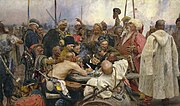Nekrasov Cossacks
| Part of a series on |
| Cossacks |
|---|
 |
| Cossack hosts |
| Other Cossack groups |
| History |
| Notable Cossacks |
| Cossack terms |
Nekrasov Cossacks, Nekrasovite Cossacks, Nekrasovites, Nekrasovtsy (Russian: Некрасовцы, Некрасовские казаки, Казаки-некрасовцы) descend from those
Initially, the Nekrasovites settled by the right bank of the
The Nekrasovites continued to raid the adjacent Russian lands, including the Don area; Russian forces carried out counter-raids. As a consequence, until 1737, several hundreds of thousands of fugitives from Southern Russia fled to the Kuban, with a significant number joining the Nekrasovites.
About 1737 the activity of the Nekrasovites petered out: historians assume that Nekrasov died in that year. Soon afterwards the Nekrasovite community began to disintegrate and resettled in the Ottoman Empire.
During the Second World War, a number of Nekrasov Cossacks participated in the war on the side of the German military.[1] In 1962 some Nekrasov Cossacks migrated to the U.S.S.R.[2] They have preserved the Don Cossack language, songs, and their ethnic identity despite their separation from other Cossacks for more than 200 years. There is an ongoing work for preserving the heritage of Nekrasov Cossacks.[citation needed]
Notes
- ^ Gubarev, G.V. (1966–1970). Cossack Reference-Dictionary (PDF). San Anselmo, CA: Skrylov, A.I. p. 292.
- ^
Compare: Barrett, Thomas M. (1999). At the Edge of Empire: The Terek Cossacks and the North Caucasus Frontier, 1700–1860. Westview Press. p. 195. ISBN 9780813336718. Retrieved 24 April 2016.
Some Nekrasov Cossacks returned to the Soviet Union in the 1920s, some in 1962, others emigrated to the United States in 1963, and the rest perpetuated their interesting traditional Cossack sub-culture in Turkey.
